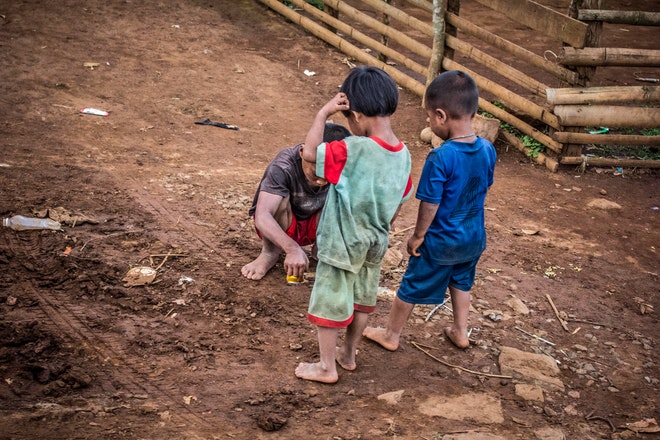Mud play allows children to develop a sense of self and belonging in the world around them. Yes, it can be a mess, but it’s also super fun and promotes creativity.
Here are 10 reasons to let your child play in mud
Teaches Problem Solving
It’s good for kids have uninterrupted time to themselves to imaginatively play with mud. This creates bountiful opportunities for them to solve problems, come up with solutions, and generally exercise their minds.
When playing in sodden dirt, your child isn’t just making mud pies. The youngster is jumping, running, crawling, and sometimes even rolling through the earthen slop. All this open-ended activity is good because it’s key to child development.
Improves Mental Health
Kids playing in mud are often chiller overall than those who don’t. Mud and dirt play can be soothing and relaxing. In fact, such activity can boost mental health: A U.K. study found that a certain soil bacterium activates neurons responsible for generating serotonin – a natural mood stabilizer. In short, playing in mud makes you happier!
Promotes Physical Health
Studies have shown that our ultra-sanitized world is partly responsible for rising levels of pediatric allergies and asthma. Exposing your child to germs and dirt helps to prime their immune system, which can prevent allergies. So, yes, letting your child get muddy is good for their physical health!
Uses Fine And Gross Motor Skills
Mud play allows kids to develop and practice these skills and improves hand/eye coordination. Think about the variety of tasks a classic “mud kitchen” offers children: measuring, weighing, and using utensils to add items to a mud pie, for example, all require fine motor skills. Mud play will also create opportunities to practice social skills and help kids make sense of the world.
Stimulates The Senses
Have you ever witnessed children running their fingers through mud, or grabbing a handful of the sludge and making a fist and letting the mud ooze out? It may not seem like a big deal, but during those minutes, children are building key nerve connections in brain pathways. Kids are intuitively attracted to activities that engage all their senses because that’s how they best learn.
Can Occur Anywhere
Mud play can happen virtually anywhere since all you need are the most rudimentary of materials — some water and dirt. For example, kids exploring a woody area can turn a fistful of mud plopped onto tree bark into a fully featured face using twigs, moss, flowers, nuts, or berries.
Connects Children To Nature
Playing in mud gives kids a chance to connect and interact with the natural world around them. Such outdoor activity gets children away from computer screens and in fresh air and sunlight. Being under the open sky and in close contact with nature is widely known to be crucial to children’s learning and development.
Builds An Adventurous Spirit
While children are sloshing and digging through mud, they’re also challenging themselves as well as enlarging and enhancing their worlds. Encouraging and nurturing this kind of critical thinking and risk assessment builds and fortifies a child’s attitudes about adventure that can carry on through adulthood.
Attracts And Validates Leaders
Children who play in mud are leaders. They’re open to experimenting and trying new things, which builds character. Mud play encourages kids to develop and lead constructive projects, getting them to think creatively and develop confidence in themselves.
Long story short, there’s more to making mud pies than meets the eye. In light of these 10 reasons to let your child play in mud, the next time your youngster wants to indulge, cheer them on — or even play along. You might be surprised to remember just how much fun it really can be!














+ There are no comments
Add yours